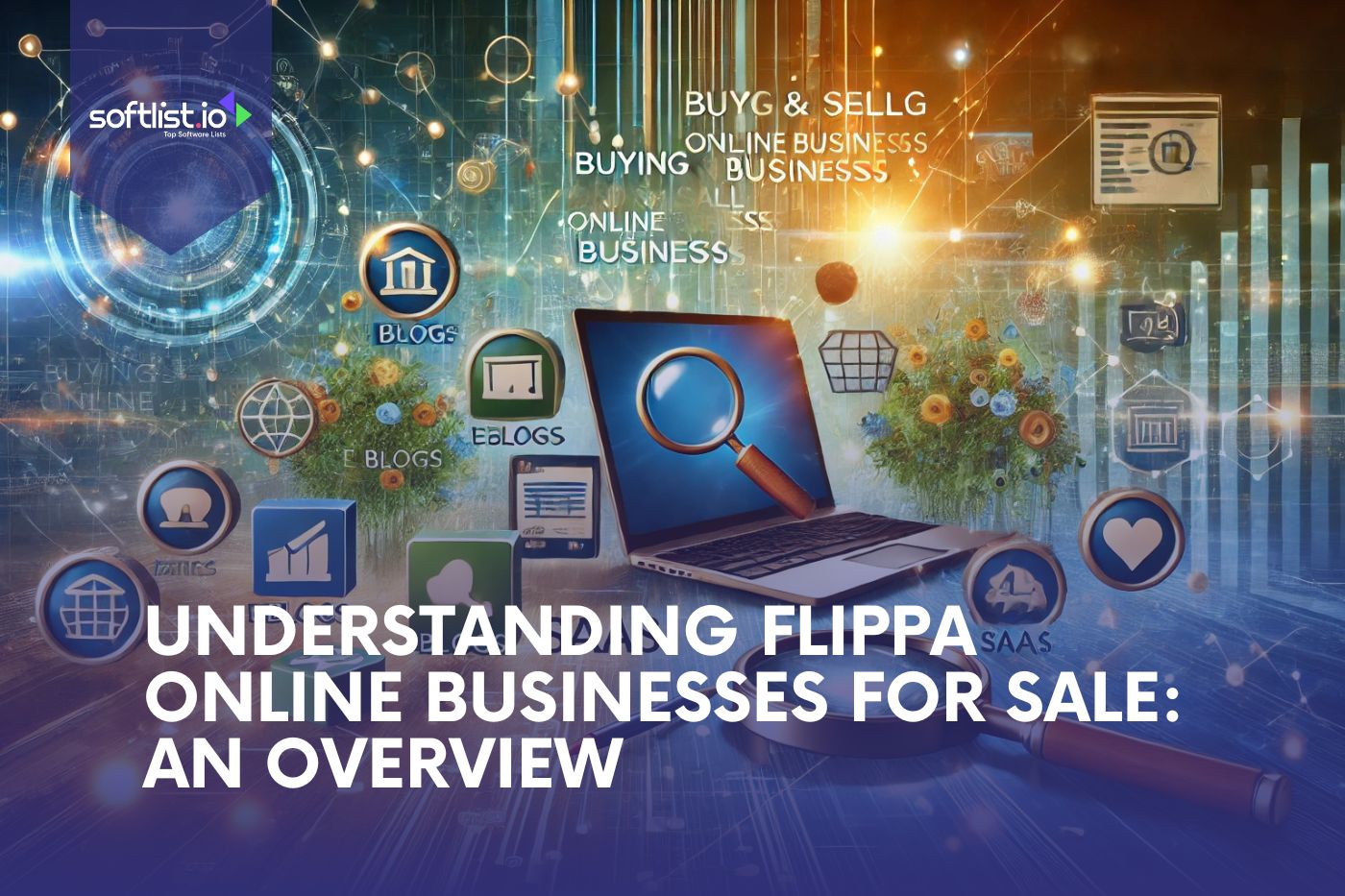The idea of buying and selling businesses online has become very popular. Website marketplaces like Flippa have become the first choice for business owners and investors who want to look into different business possibilities.
This market has a lot of different websites and online businesses for sale, covering a lot of different areas and industries. If you know how to buy and sell online businesses properly, you can find many profitable business options, no matter how experienced an investor you are or how new an entrepreneur you are.
Key Takeaways
- Flippa is a go-to platform for buying and selling online businesses, offering a variety of options like eCommerce sites, blogs, and SaaS platforms.
- Online businesses are cheaper to start and manage compared to traditional ones, with global reach and lower costs.
- Investing in Flippa online business can bring steady income with less effort, especially if the business already has customers and revenue.
- Flippa provides tools to check a business’s value and authenticity, helping buyers make smarter decisions.
- Sellers can boost their chances of finding buyers by preparing strong listings, clear financials, and showcasing growth potential.
What Are Online Businesses for Sale?

Source: Canva
Online businesses for sale refer to existing digital entities available for purchase, which can include eCommerce sites, blogs, SaaS applications, content sites, and more. These businesses typically operate entirely on the internet, leveraging digital platforms to reach their target audiences.
Unlike traditional brick-and-mortar businesses, online businesses benefit from reduced overhead costs, global reach, and the flexibility of being operated from virtually anywhere.
How Do Online Businesses Differ from Traditional Businesses?
Online businesses are distinct from traditional businesses in several key aspects. First, they often require lower initial capital investment due to the absence of physical infrastructure. Additionally, online businesses benefit from digital marketing strategies and tools, enabling them to target specific demographics efficiently.
The use of plugins, WordPress apps, and cloud plugins can further streamline operations, enhancing the scalability and adaptability of these internet businesses. Meanwhile, traditional businesses typically face higher operational costs and limited geographical reach.
Why Consider Investing in an Online Business?
Investing in an online business presents a lucrative opportunity for many reasons. The digital economy has shown consistent growth, with internet businesses experiencing substantial expansion in numerous sectors, including eCommerce and tech.
An established online business can generate passive income streams, such as those offered by Amazon Associates programs, which make it an attractive option for investors seeking returns with minimal active involvement.
Furthermore, the ability to buy online businesses with existing customer bases and revenue streams reduces the risks associated with starting a new venture from scratch.
What Are the Common Platforms for Buying and Selling?
Several platforms facilitate the buying and selling of online businesses, each offering unique features tailored to different needs. Flippa is well-known as the original website marketplace, providing early access to a diverse range of websites for sale.
Other platforms include Empire Flippers, which specializes in transactions involving content sites, and MicroAcquire, which focuses on SaaS businesses. These platforms typically offer valuation tools to assist buyers in determining the fair market value of a business for sale, providing valuable insights into potential deals and negotiation strategies.
How to Evaluate a Business for Sale?

Source: Canva
Evaluating a business for sale is a crucial step in the purchasing process, requiring a comprehensive analysis of financial metrics, operational details, and market positioning. Potential buyers should carefully assess these factors to ensure they are making a sound investment decision.
What Financial Metrics Should Be Considered?
Key financial metrics to consider include revenue, profit margins, and cash flow. Understanding these metrics helps buyers gauge the financial health and sustainability of the business. Moreover, examining customer acquisition costs, churn rates, and lifetime value can offer insights into the business’s long-term viability.
Platforms like Flippa allow buyers to get a valuation using their proprietary tools, assisting in determining whether a business is priced appropriately against industry standards.
How to Verify the Authenticity of a Listing?
Verifying the authenticity of a listing is paramount to avoid potential fraud or misrepresentation. Buyers should conduct thorough due diligence by requesting financial statements, traffic reports, and customer data.
Leveraging vetting teams and third-party services can add an extra layer of verification, ensuring the business’s claims are substantiated. Additionally, potential buyers should assess the seller’s reputation and history within the marketplace, often provided through buyer reviews and feedback.
What Tools Can Help in Due Diligence?
Several tools are available to assist in the due diligence process. Google Analytics offers insights into web traffic and audience behavior, while SEO tools like Ahrefs or SEMrush help evaluate the business’s online visibility and competition.
For financial analysis, tools like QuickBooks or Xero can provide detailed insights into the business’s accounting practices. These tools collectively aid in making informed decisions when exploring business opportunities.
Types of Online Businesses Available

Source: Canva
The marketplace for online businesses is rich with diverse categories, each offering unique advantages and challenges. Understanding the different types can help buyers identify opportunities that align with their skills and interests.
What Are the Different Categories of Websites for Sale?
Websites for sale can be categorized into various types, including eCommerce sites, content sites, SaaS platforms, and domain portfolios. eCommerce sites, like those integrated with Amazon or Shopify, capitalize on product sales and fulfillment services.
Content sites usually generate revenue through advertising and affiliate marketing, relying heavily on SEO for traffic. SaaS businesses offer subscription-based software solutions, providing a recurring income model. Each category requires specific management skills and capital investment levels.
Understanding SaaS, eCommerce, and Content-Based Models
SaaS, or Software as a Service, involves delivering software solutions via the cloud, often commanding higher valuations due to their scalability and recurring revenue models. eCommerce businesses focus on selling products online, requiring expertise in supply chain management and digital marketing.
Content-based models generate income through ads, sponsorships, and affiliate links, relying on consistent, high-quality content production to attract and retain visitors. Understanding these models is crucial for identifying the right business opportunity on platforms like Flippa.
How Do Shopify Stores Fit into the Marketplace?
Shopify stores are a popular choice for individuals looking to enter the eCommerce space. These stores provide a user-friendly platform for setting up and managing online product sales, often integrated with various plugins and applications to optimize operations.
In the marketplace context, Shopify stores present a viable option for buyers looking to acquire turnkey eCommerce businesses with proven sales records and established customer bases.
What Should Business Owners Know Before a Sale?

Source: Canva
Selling a website or online business requires preparation to maximize value and attract buyers. Focus on clean records, standout features, and strategic presentation.
How to Prepare Your Business for Sale
Get all financials in order, including 15 financial documents like tax returns and profit statements. Ensure operations run smoothly, and highlight key assets such as SaaS assets, Stripe integration, or an ERP system. Use tools to analyze growth potential and get a valuation using 1 marketplace to stay competitive.
Documentation Buyers Expect
Buyers would expect complete transparency. Prepare financial records, website analytics, contracts, and agreements with communities and plugins or third-party services. Detailed access data helps demonstrate the business’s value, whether for startups or seasoned entrepreneurs.
Showcasing Your Business to Buyers
Create an attractive listing for buyers that emphasizes strengths like low operating costs, scalability, and assets, including SaaS. Use visuals, customer testimonials, and relevant keywords to boost visibility. Show comparisons and provide live market data to evaluate competitively.
Why Preparation Matters
Buyers, including entrepreneurs and startups, want clarity and growth opportunities. Tools, clear financials, and a strong pitch make your business appealing to the right audience.
How to Find the Right Buyer for Your Business?

Source: Canva
Identifying the ideal buyer involves a strategic approach, combining effective marketing, targeted outreach, and skillful negotiation to secure favorable terms for the sale of your online business.
What Are the Key Strategies for Attracting Buyers?
Key strategies to attract buyers include expanding the business’s online presence through social media and targeted advertising. Networking within relevant industry circles can also introduce potential buyers who have a genuine interest in and understanding of your niche.
Offering flexible terms, such as seller financing, can further entice interested parties, broadening the pool of potential buyers.
Using Keywords to Enhance Listing Visibility
Employing strategic keywords in your listing can significantly enhance its visibility in marketplace searches. Keywords related to the business’s niche, such as “SaaS,” “eCommerce,” or “profitable content site,” should be woven naturally throughout the listing.
This optimization increases the chances of the business appearing in relevant searches conducted by serious buyers.
How to Navigate Initial Offers and Negotiations?
Navigating initial offers and negotiations requires a balanced approach, combining assertiveness with flexibility. Sellers should be prepared to counter initial offers with data-backed valuations, using tools such as Flippa’s to justify pricing.
Maintaining open communication and understanding the buyer’s perspective can lead to mutually beneficial agreements, facilitating a successful transaction.
User Experience and Feedback: Flippa Online Business for Sale
What Do Users Say About Flippa?
People who use Flippa often talk about how easy it is to use and how many tools it has that make buying and selling easier. Entrepreneurs like how varied the offerings are, and investors like how many metrics and analytics are available for each business.
How Does Flippa Enhance User Experience?
Flippa makes the experience better for users by using advanced search filters, easy-to-use navigation, and its own assessment tools. With these features, users can quickly and confidently find the best business options.
Common Feedback from Buyers and Sellers
Buyers like Flippa because it is open and easy to view its financial data and performance reports. Sellers like how it reaches a lot of people and how easy it is to list their items. Some users, though, say that the screening process could be better to build trust.
Tips for Maximizing Your Experience
- For Buyers: Use Flippa’s tools to evaluate and do due research to make smart choices.
- For Sellers: To get serious buyers, make sure your listings are well-written, include good shots and descriptions, and include clear financial information.
Flippa is still a top platform, known for its strong customer service and features that meet the needs of digital businesses and investors.
Final Thoughts
Buying and selling online businesses has become a useful and profitable way to make money or start over. Flippa is the most popular and trusted site for these kinds of deals. Flippa’s tools and resources make it easy for buyers to find good deals and for sellers to show off their businesses in the best way possible.
In order to make smart choices about eCommerce, SaaS, or content sites, it’s helpful to know the basics of valuation, due research, and listing optimization. You can cut down on risks and boost returns by using analytics tools, financial reviews, and customer feedback.
Flippa’s wide range of products and easy-to-use interface make it a good choice for both experienced buyers and people who are just starting out. If you want to sell your business, getting it ready for sale can help you get the right buyers faster.
If you are a buyer, carefully looking over listings will help you find companies that fit your needs. Find out what you can do today by going to Flippa and looking at the business possibilities there.
Unlock exclusive savings on top products with Softlist’s unbeatable deals—click here to start saving today! Dive into trusted insights with our top product reviews and make smarter buying decisions effortlessly.
FAQs: Flippa Online Business for Sale
Can I Sell My Website on Flippa?
Yes, you can sell your website on Flippa, the #1 marketplace for digital real estate, including eCommerce stores, SaaS integrations, and AI apps. Flippa’s platform ensures maximum exposure by connecting sellers with a global buyer base and providing tools like traffic insights, refund rates, and growth metrics to highlight key financials.
Has Anyone Made Money on Flippa?
Many sellers and buyers have profited on Flippa, thanks to its live market data and thousands of comparable sales for benchmarking.
With features like integrated offers platforms, partnerships with SEMrush, and access to financial data, users have successfully closed deals sub $5K to high-value transactions involving strategic buyers.
How to Make Money From Flippa?
You can make money on Flippa by evaluating competitively using live market data, comprehensive performance data, and tools like Google AdMob or Stripe integration insights. Include detailed information like backlinks, visitor numbers, and financial performance to make your listing attractive to active acquirers worldwide.
Is Website Selling Profitable?
Website selling can be very profitable, especially for currently profitable sites, SaaS assets, and eCommerce stores. By maximizing sales affordably and ensuring the listing includes strategic growth metrics, you can attract entrepreneurs and responsive buyers in this competitive market.
Who is the CEO of Flippa?
Blake Hutchison is the CEO of Flippa, leading the platform with a focus on providing low-cost, accessible tools for entrepreneurs and active buyers to browse and transact digital assets efficiently.






